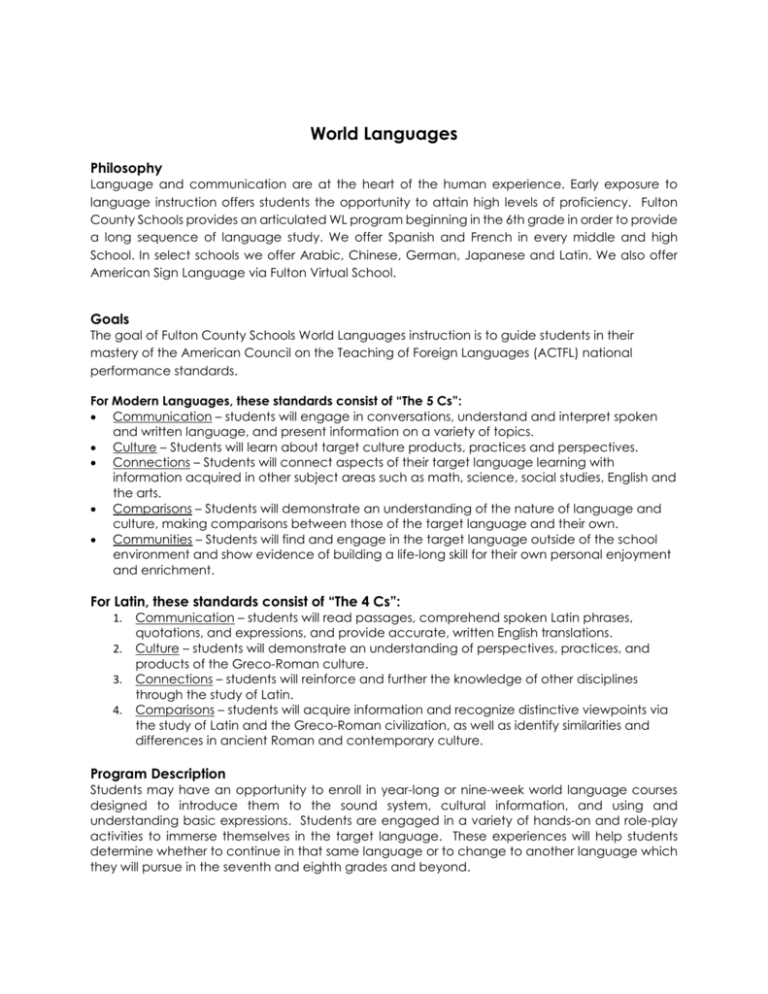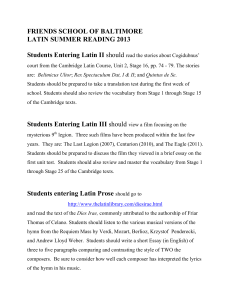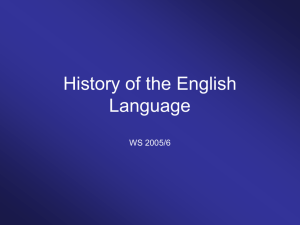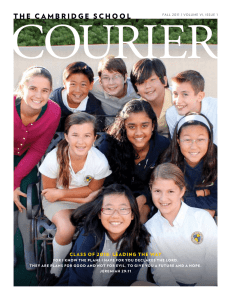MS World Languages Core Curriculum
advertisement

World Languages Philosophy Language and communication are at the heart of the human experience. Early exposure to language instruction offers students the opportunity to attain high levels of proficiency. Fulton County Schools provides an articulated WL program beginning in the 6th grade in order to provide a long sequence of language study. We offer Spanish and French in every middle and high School. In select schools we offer Arabic, Chinese, German, Japanese and Latin. We also offer American Sign Language via Fulton Virtual School. Goals The goal of Fulton County Schools World Languages instruction is to guide students in their mastery of the American Council on the Teaching of Foreign Languages (ACTFL) national performance standards. For Modern Languages, these standards consist of “The 5 Cs”: • Communication – students will engage in conversations, understand and interpret spoken and written language, and present information on a variety of topics. • Culture – Students will learn about target culture products, practices and perspectives. • Connections – Students will connect aspects of their target language learning with information acquired in other subject areas such as math, science, social studies, English and the arts. • Comparisons – Students will demonstrate an understanding of the nature of language and culture, making comparisons between those of the target language and their own. • Communities – Students will find and engage in the target language outside of the school environment and show evidence of building a life-long skill for their own personal enjoyment and enrichment. For Latin, these standards consist of “The 4 Cs”: 1. 2. 3. 4. Communication – students will read passages, comprehend spoken Latin phrases, quotations, and expressions, and provide accurate, written English translations. Culture – students will demonstrate an understanding of perspectives, practices, and products of the Greco-Roman culture. Connections – students will reinforce and further the knowledge of other disciplines through the study of Latin. Comparisons – students will acquire information and recognize distinctive viewpoints via the study of Latin and the Greco-Roman civilization, as well as identify similarities and differences in ancient Roman and contemporary culture. Program Description Students may have an opportunity to enroll in year-long or nine-week world language courses designed to introduce them to the sound system, cultural information, and using and understanding basic expressions. Students are engaged in a variety of hands-on and role-play activities to immerse themselves in the target language. These experiences will help students determine whether to continue in that same language or to change to another language which they will pursue in the seventh and eighth grades and beyond. Grades 6, 7 and 8 Students may begin formal language study in either sixth or seventh grade by selecting the one language, offered at their school, they would like to pursue. At the conclusion of both the grade seven and grade eight world language program, students will have completed the equivalent of the level one high school course and may be eligible for level two language study in grade nine. Students who successfully complete the grade eight course may receive one unit of credit toward high school graduation. Successful completion can be defined as four (4) semesters of the same World Language in which the student has received a grade of 70 or above. A passing grade is necessary in the first and second semester of grade seven and the 1st and 2nd semester of the grade eight to receive a High School credit. Passing scores are based on individual semesters and are not averaged. Textbooks: ¡En español (Uno), McDougal, Littell, 2004 Discovering French (Bleu), McDougal, Littell, 2004 Komm mitt! 1, Holt, Rinehart, Winston, 2003 Obentoo, Cheng & Tsui, 1999 Latin Is Fun, AMSCO, 2003 Phenomenon of Language, Tabula Latina, 1990 Minimus, Cambridge University Press, 2006 Cambridge Latin Course – Unit 1, Cambridge University Press, 2003 Cambridge Latin Course – Unit 2, Cambridge University Press, 2003 Ni Hao 1, Cheng & Tsui, 2001 Assessment Assessment is an important part of the educational process that communicates the value which our society places on learning. Assessment results keep both parents and students informed about their progress in the course. Students are evaluated in a variety of ways including unit tests and quizzes (both teacher-made and commercially-produced), oral and written performance on designated material as well as impromptu situations, responding to questions and other language expressions, class participation, projects, and completion of class and homework assignments. Performance based assessments are also used throughout the school year to assess student proficiency in speaking and writing. District-wide Final Common Assessments are given at the end of the school year to seventh and eighth grade students to assess overall student performance.









